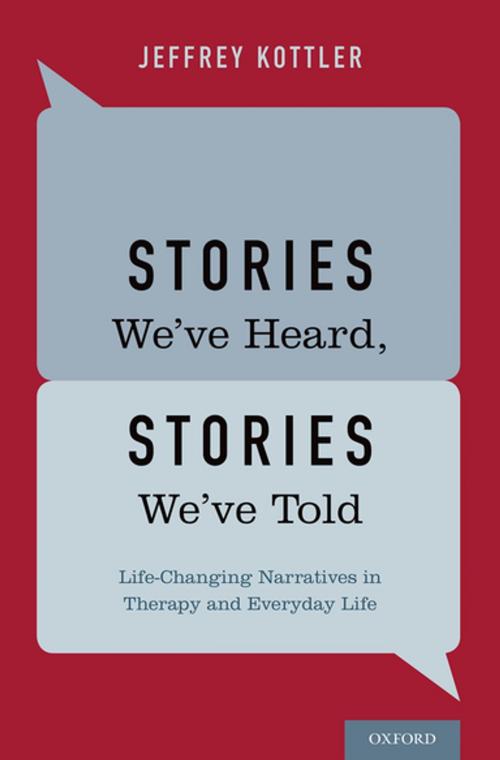Stories We've Heard, Stories We've Told
Life-Changing Narratives in Therapy and Everyday Life
Nonfiction, Social & Cultural Studies, Social Science, Social Work| Author: | Jeffrey Kottler | ISBN: | 9780199328277 |
| Publisher: | Oxford University Press | Publication: | September 26, 2014 |
| Imprint: | Oxford University Press | Language: | English |
| Author: | Jeffrey Kottler |
| ISBN: | 9780199328277 |
| Publisher: | Oxford University Press |
| Publication: | September 26, 2014 |
| Imprint: | Oxford University Press |
| Language: | English |
This is a book that integrates what is known from a wide variety of disciplines about the nature of storytelling and how it influences and transforms people's lives. Drawing on material from the humanities, sociology, anthropology, neurophysiology, media and communication studies, narrative inquiry, indigenous healing traditions, as well as education, counseling, and therapy, the book explores the ways that therapists operate as professional storytellers. In addition, our job is to hold and honor the stories of our clients, helping them to reshape them in more constructive ways. The book itself is written as a story, utilizing engaging prose, research, photographs, and powerful anecdotes to draw readers into the intriguing dynamics and processes involved in therapeutic storytelling. It sets the stage for what follows by discussing the ways that stories have influenced history, cultural development, and individual worldviews and then delves into the ways that everyday lives are impacted by the stories we hear, read, and view in popular media. The focus then moves to stories within the context of therapy, exploring how client stories are told, heard, and negotiated in sessions. Attention then moves to the ways that therapists can become more skilled and accomplished storytellers, regardless of their theoretical preferences and style.
This is a book that integrates what is known from a wide variety of disciplines about the nature of storytelling and how it influences and transforms people's lives. Drawing on material from the humanities, sociology, anthropology, neurophysiology, media and communication studies, narrative inquiry, indigenous healing traditions, as well as education, counseling, and therapy, the book explores the ways that therapists operate as professional storytellers. In addition, our job is to hold and honor the stories of our clients, helping them to reshape them in more constructive ways. The book itself is written as a story, utilizing engaging prose, research, photographs, and powerful anecdotes to draw readers into the intriguing dynamics and processes involved in therapeutic storytelling. It sets the stage for what follows by discussing the ways that stories have influenced history, cultural development, and individual worldviews and then delves into the ways that everyday lives are impacted by the stories we hear, read, and view in popular media. The focus then moves to stories within the context of therapy, exploring how client stories are told, heard, and negotiated in sessions. Attention then moves to the ways that therapists can become more skilled and accomplished storytellers, regardless of their theoretical preferences and style.















